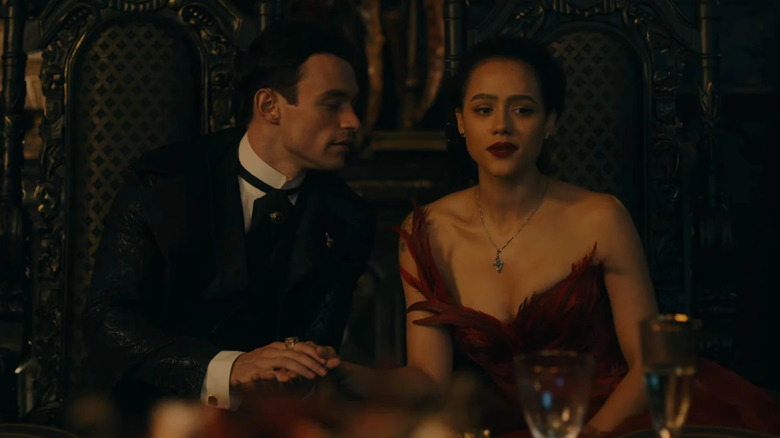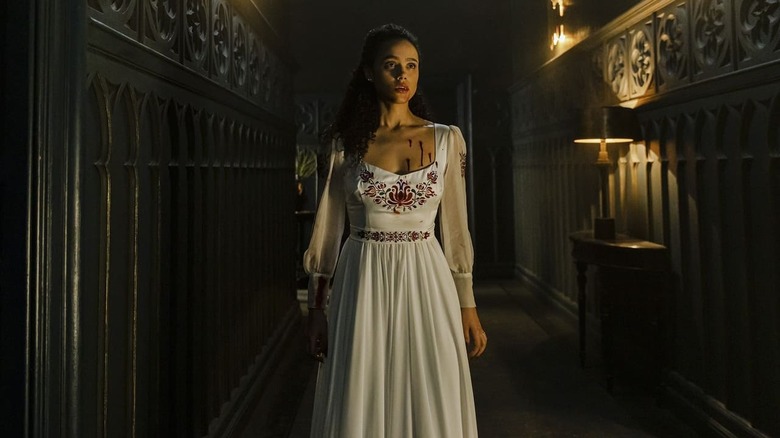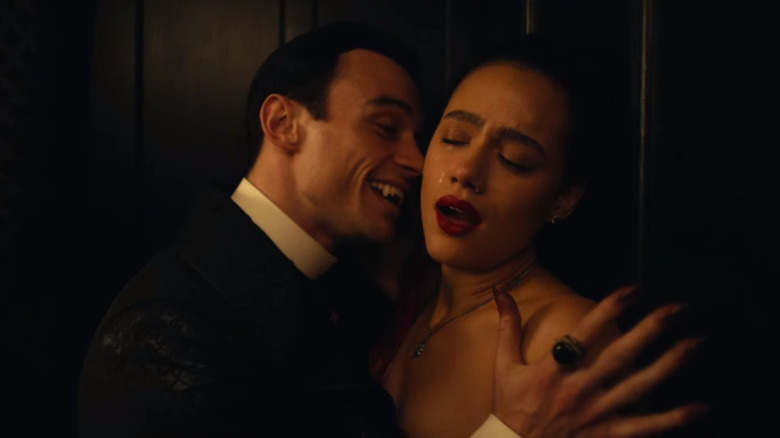The Invitation Ending Explained: The Aristocrats!
This post contains spoilers for the 2022 film "The Invitation."
If one were to enter Jessica M. Thompson's new film "The Invitation" without any knowledge of its plot, one would find themselves quite startled by its twist. About an hour into the film, a shocking piece of information is revealed about the dash handsome aristocrat Walter De Ville which some may not have seen coming. Although, some might have after all, given that Thompson's film is rather explicitly about destroying the too-long legacy of the European colonialist aristocracy. It makes sense that the nature of the aristocracy is how Thompson envisioned it.
In "The Invitation," Nathalie Emmanuel plays Evie, a woman trapped in a demeaning waitstaff job where she and her co-workers are regularly harassed and groped by their wealthy clientele. Right away, Thompson is establishing her thesis, that is: the wealthy white elite casually abuse the working class, mostly people of color. Class and race are going to be vital to this film going forward.
When Evie receives a free genealogy test from an event she catered, she idly sends in her saliva for analysis and finds that she has an extended and long-lost wealthy family in England. She meets a distant British cousin named Oliver (Hugh Skinner) who explains that Evie is several generations removed from an illicit affair his great-grandmother had with a Black footman nearly a century prior. Oliver is excited to introduce her to the family, and she is flown to England where she is immediately on the receiving end of multiple casually racist assumptions. Evie has moved into a circle with more money than most people see in their lives, and the attitudes and abuse remain constant.
There's something very familiar about all this
Thompson drops a few pretty obvious clues early on. When Evie arrives at her family's enormous estate, it is said to be near Whitby harbor at the New Carfax Abbey. Fans of Bram Stoker's 1987 novel "Dracula" will instantly recognize those locations as the primary setting of the famed vampire book. Most audiences will be instantly on the lookout for a Transylvanian vampire lord.
And lo, as if on cue, Thompson introduces Walter De Ville (Thomas Doherty) a neighboring lord and one of the most handsome, affable, charming men on the planet. He's definitely a vampire. Walter proceeds to aggressively charm Evie and offers her respite from the bustle of an upcoming wedding being held in the castle. The two often sneak off and chat, bond, and end up falling into bed together. Very occasionally, too, audiences will see members of the mansion's waitstaff wandering into dark wine cellars where they are instantly eaten by some sort of creature in the dark. No prizes for guessing that it's a vampire that lives on the premises.
At an enormous, long-table banquet, the twist of "The Invitation" is revealed: Walter is a vampire, natch. Indeed, he is Count Dracula.
Dracula, it seems, has spent the last few centuries protecting the wealth and land ownership of a trio of local aristocratic families, while he, in exchange, has been allowed to marry their daughters in a polygamous setup. Dracula has two brides from two of the families and now wishes to marry Evie, essentially completing his Bride collection.
Evie, we see, is — even under these monstrous circumstances — still treated like an asset, a working body that the wealthy can exploit. This time, however, the bourgeoisie literally want her blood and soul.
Down with the bourgeoisie
There has always been a streak of class consciousness in the Dracula story, in that the Count is, well, a Count. The vampire is a member of the oligarchy, and he literally feeds on the women who seek to marry into the upper echelons of wealth. In serving "old money," you are transformed into a monster yourself. The blood-drinking blueblood is a symbol of the decay caused by stubbornly unending intergenerational wealth.
It's certainly notable that Dracula was based on the Romanian ruler Vlad Țepeș, known for his cruelty and his habit of impaling his victims. Europe's memories of war and murder carry on in its castles and armor and other estate-bound, bloodletting accouterments. Blood and money have always been linked.
The casual human aristos in "The Invitation" aren't literally transformed into vampires, but they certainly are keen to retain their "legacy," and have no compunction about handing off the necks of their waitstaff to Dracula so that he may have a drink during dinner.
The catharsis of "The Invitation" comes, of course, when Evie realizes Walter's whole evil plan, and manages to break free. One bloody climax later, the entire estate is burning to the ground. The young Black woman, long rejected from an old, racist institution, finally ends its dark legacy with a cleansing fireball. Good riddance. And, not to be outdone, Thomas and screenwriter Blair Butler add an epilogue wherein Evie and her friend Grace (Courtney Taylor) have more or less become Van Helsings, stalking and killing anyone who managed to escape the film's climactic conflagration. One burning mansion isn't enough. Evie must cut off every family line.
"The Invitation" is cheap, corny, and pretty predictable, but there is just enough righteous class rage to give it some flavor.


